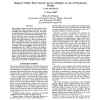Free Online Productivity Tools
i2Speak
i2Symbol
i2OCR
iTex2Img
iWeb2Print
iWeb2Shot
i2Type
iPdf2Split
iPdf2Merge
i2Bopomofo
i2Arabic
i2Style
i2Image
i2PDF
iLatex2Rtf
Sci2ools
118
click to vote
AAAI
1998
1998
Highest Utility First Search Across Multiple Levels of Stochastic Design
Manydesign problems are solved using multiple levels of abstraction, wherea design at one level has combinatorially manychildren at the next level. A stochastic optimization methods, such as simulated annealing, genetic algorithms and multi-start hill climbing, is often used in such cases to generate the children of a design. This gives rise to a search tree for the overall problemcharacterized by a large branching factor, objects at different levels that are hard to compare, and a child-generator that is too expensive to run more than a few times at each level. Wepresent the Highest Utility First Search (HUES)control algorithm for searching such trees. HUFSis based on an estimate wederive for the expected utility of starting the design process from any given design alternative, whereutility reflects both the intrinsic value of the final result and the cost in computingresources it will take to get that result. Wealso present an empirical study applying HUFSto the problem of VLSI modu...
AAAI 1998 | Intelligent Agents | Large Branching Factor | Multi-start Hill Climbing | Stochastic Optimization Methods |
| Added | 01 Nov 2010 |
| Updated | 01 Nov 2010 |
| Type | Conference |
| Year | 1998 |
| Where | AAAI |
| Authors | Louis I. Steinberg, J. Storrs Hall, Brian D. Davison |
Comments (0)

